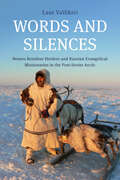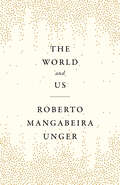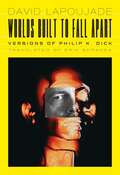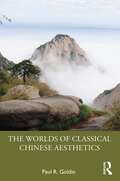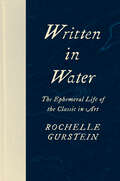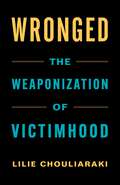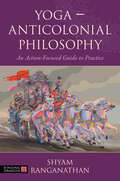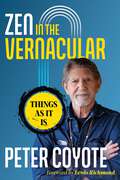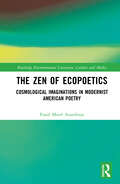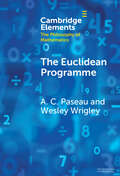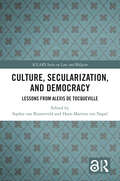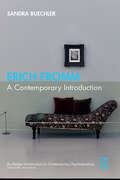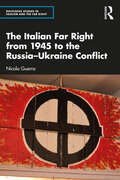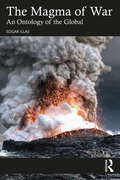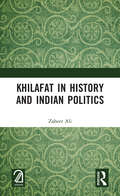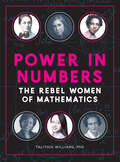- Table View
- List View
Words and Silences: Nenets Reindeer Herders and Russian Evangelical Missionaries in the Post-Soviet Arctic
by Laur VallikiviWords and Silences tells the story of an extraordinary group of independent Nenets reindeer herders in the northwest Russian Arctic. Under socialism these nomads managed to avoid the Soviet state and its institutions of collectivization, but soon after the atheist regime collapsed, while some staunchly resisted, many of them became fervent fundamentalist Christians. By exploring differing concepts of how traditional and convert Nenets use and define words and of the meanings they ascribe to the withholding of speech, Laur Vallikivi shows how a local form of global Christianity has emerged through intricate negotiations of self, sociality, and cosmology. Moving beyond studies of modernization and globalization that have all-too-predictable outcomes for indigenous peoples, Words and Silences invites us to view not only religious devotees, but words themselves, as agents of a complex and ongoing transformation.
The World and Us
by Roberto Mangabeira Unger"A restless visionary striving to realize the highest aspirations of modernity itself."–New York TimesA radical re-envisioning of the human condition by the acclaimed Brazilian philosopherIn The World and Us, Roberto Mangabeira Unger sets out to reinvent philosophy. His central theme is our transcendence, everything in our existence points beyond itself, and its relation to our finitude: everything that surrounds us, and we ourselves, are flawed and ephemeral.He asks how we can live so that we die only once, instead of dying many small deaths; how we can breathe new life and new meaning into the revolutionary movement that has aroused humanity for the last three centuries, but that is now weakened and disoriented; and how we can make sense of ourselves without claiming for human beings a miraculous exception to the general regime of nature. For Unger, philosophy must be the mind on fire, insisting on our prerogative to speak to what matters most.From this perspective, he redefines each of the traditional parts of philosophy, from ontology and epistemology to ethics and politics. He turns moral philosophy into an exploration of the contest between the two most powerful contemporary moral visions: an ethic of self-fashioning and non-conformity, and an ethic of human connection and responsibility.And he turns political philosophy into a program of deep freedom, showing how to democratize the market economy, energize democratic politics, and give the individual worker and citizen the means to flourish amid permanent innovation.
Worlds Built to Fall Apart: Versions of Philip K. Dick (Univocal)
by David LapoujadePhilosophically analyzing the work of one of the twentieth century&’s most popular, and peculiar, science fiction authors Despite his enduring popularity, Philip K. Dick (1928–1982)—whose short stories and novels were adapted into or influenced many major films and television shows, including Blade Runner, Total Recall, The Truman Show, and The Man in the High Castle—has long been a marginal figure in American literature, even in the science fiction genre he helped revolutionize. Here, an influential French philosopher offers a major new perspective on an author who was known as much for his eccentricities and excesses as for his writing. For David Lapoujade, it is precisely the many ways in which Dick&’s works seem to hover on the brink of losing all touch with reality that make him such a singular figure, both as a sci-fi author and as a thinker of contemporary life. In Worlds Built to Fall Apart, Lapoujade defines sci-fi as a way of thinking through the creation of worlds and argues that Dick does so by creating worlds that fall rapidly to pieces. Whatever his mechanism to bring this about (drugs or madness, alien satellite transmissions or encroaching parallel universes), the effect is always to reveal reality to be a construction, in which certain people determine what appears as real to the rest of us. Orienting Dick within philosophy and drawing connections to a wide variety of other thinkers and artists, this remarkable reading shows how he proposes unstable, fluctuating futures in which tinkering with reality has become the best means of resisting total control. Engaging with most of Philip K. Dick&’s published works, as well as with several of his essays and his notorious psychic autobiography The Exegesis, Lapoujade hones in on the &“war of the psyches&” that underlies Dick&’s critique of reality. He puts Dick&’s work in conversation with a vast array of subjects—from cybernetics to schizoanalysis, and from Pop art to David Lynch, J. G. Ballard, and William S. Burroughs—revealing Dick&’s oeuvre to comprise a profound reality defined by artifice, precarity, and control. Retail e-book files for this title are screen-reader friendly.
The Worlds of Classical Chinese Aesthetics
by Paul R. GoldinThis book presents the foundations of classical Chinese aesthetic discourse - roughly from the Bronze Age to the early Middle Ages - with the following animating questions:What is art?Why do we produce it?How do we judge it?The arts that garnered the most theoretical attention during this time period were music, poetry, calligraphy, and painting, and this book considers the reasons why these four were privileged. Whereas modern artists most likely consider themselves musicians or poets or calligraphers or painters or sculptors or architects, the pre-modern authors who produced the literature that established Chinese aesthetics prided themselves on being wenren, “cultured people,” conversant with all forms of art and learning. Other comparisons with Western theories and works of art are presented at due junctures.Key Features Addresses Chinese aesthetic discourse on its own terms Provides comparisons of key concepts and theories with examples from Western sources Includes more coverage of primary sources than any other English-language book on the subject Each chapter opens with a helpful summary, highlighting the chapter’s key themes
Written in Water: The Ephemeral Life of the Classic in Art
by Rochelle GursteinA deeply personal yet broadly relevant exploration of the ephemeral life of the classic in art, from the eighteenth century to our own day Is there such a thing as a timeless classic? More than a decade ago, Rochelle Gurstein set out to explore and establish a solid foundation for the classic in the history of taste. To her surprise, that history instead revealed repeated episodes of soaring and falling reputations, rediscoveries of long-forgotten artists, and radical shifts in the canon, all of which went so completely against common knowledge that it was hard to believe it was true. Where does the idea of the timeless classic come from? And how has it become so fiercely contested? By recovering disputes about works of art from the eighteenth century to the close of the twentieth, Gurstein takes us into unfamiliar aesthetic and moral terrain, providing a richly imagined historical alternative to accounts offered by both cultural theorists advancing attacks on the politics of taste and those who continue to cling to the ideal of universal values embodied in the classic. As Gurstein brings to life the competing responses of generations of artists, art lovers, and critics to specific works of art, she makes us see the same object vividly and directly through their eyes and feel, in all its enlarging intensity, what they felt.
Wronged: The Weaponization of Victimhood
by Lilie ChouliarakiWhy is being a victim such a potent identity today? Who claims to be a victim, and why? How have such claims changed in the past century? Who benefits and who loses from the struggles over victimhood in public culture?In this timely and incisive book, Lilie Chouliaraki shows how claiming victimhood is about claiming power: who deserves to be protected as a victim and who should be punished as a perpetrator. She argues that even though victimhood has long been used to excuse violence and hierarchy, social media platforms and far-right populism have turned victimhood into a weapon of the privileged. Drawing on recent examples such as the overturning of Roe v. Wade, movements like #MeToo and Black Lives Matter, and the COVID-19 pandemic, as well as historical ones from the major wars of the twentieth century and the Civil Rights Movement, Wronged reveals why claims of victimization are so effective at reinforcing instead of alleviating inequalities of class, gender, and race. Unless we come to recognize the suffering of the vulnerable for what it is—a matter not of victimhood but of injustice—Chouliaraki powerfully warns, the culture of victimhood will continue to perpetuate old exclusions and enable further injuries.
Yoga – Anticolonial Philosophy: An Action-Focused Guide to Practice
by Shyam RanganathanProviding a decolonial, action-focused account of Yoga philosophy, this practical work from Dr. Shyam Ranganathan, pioneering scholar in the field of Indian moral philosophy, focuses on the South Asian tradition to explore what Yoga was like prior to colonization. It challenges teachers and trainees to reflect on the impact of Western colonialism on Yoga as well as understand Yoga as the original decolonial practice in a way that is accessible. Each chapter takes the reader through a journey of sources and traditions, beginning with an investigation into the colonial -Platonic and Aristotelian- approaches to pedagogy in colonized yoga spaces, through contrary, ancient philosophies of South Asia, such as Jainism, Buddhism, Sankhya, and various forms of Vedanta, to sources of Yoga, including the Upanisads, Yoga Sutra, Bhagavad Gita and Hatha Yoga Pradipika. With discussions of the precolonial philosophy of Yoga, its relationship to social justice, and modern postural yoga's relationship with colonial trauma, this is a comprehensive guide for any yoga teacher or trainee to activate and synergize their practice. Supplementary online resources bring the text to life, making this the perfect text for yoga teacher trainings.
Zen in the Vernacular: Things As It Is
by Peter Coyote• Shows how Zen offers a creative problem-solving mechanism and moral guide ideal for the stresses and problems of daily life• Shares the author&’s secular, vernacular interpretations of the Four Noble Truths, the Three Treasures, the Eightfold Path, and other fundamental Buddhist ideasDuring the nearly 3,000 years since the Buddha lived, his teachings have spread widely around the globe. In each culture where Buddhism was introduced, the Buddha&’s teachings have been pruned and modified to harmonize with local customs, laws, and cultures. We can refer to these modifications as &“gift wrapping,&” translating the gifts of Buddha&’s teachings in ways sensible to particular cultures in particular times. This gift-wrapping explains why Indian, Tibetan, Vietnamese, Japanese, Chinese, and Indonesian Buddhism have significant differences.In this engaging guide to Zen Buddhism, award-winning actor, narrator, and Zen Buddhist priest Peter Coyote helps us peer beneath the Japanese gift-wrapping of Zen teachings to reveal the fundamental teachings of the Buddha and show how they can be applied to contemporary daily life. The author explains that the majority of Western Buddhists are secular and many don&’t meditate, wear robes, shave their heads, or believe in reincarnation. He reminds us that the mental/physical states achieved by Buddhist practice are universal human states, ones we may already be familiar with but perhaps never considered as possessing spiritual dimensions.Exploring Buddha&’s core teachings, the author shares his own secular and accessible interpretations of the Four Noble Truths, the Three Treasures, and the Eightfold Path within the context of his lineage and the teachings of his teacher and the teachers before him. He looks at Buddha&’s teachings on our singular reality that appears as a multiplicity of things and on the &“self&” that perceives reality, translating powerful spiritual experience into the vernacular of modern life.Revealing the practical usefulness of Buddhist philosophy and practice, Zen in the Vernacular shows how Zen offers a creative problem-solving mechanism and moral guide ideal for the stresses and problems of everyday life.
The Zen of Ecopoetics: Cosmological Imaginations in Modernist American Poetry (Routledge Environmental Literature, Culture and Media)
by Enaiê Mairê AzambujaThis book is the first comprehensive study investigating the cultural affinities and resonances of Zen in early twentieth-century American poetry and its contribution to current definitions of ecopoetics, focusing on four key poets: William Carlos Williams, Marianne Moore, Wallace Stevens, and E.E. Cummings. Bringing together a range of texts and perspectives and using an interdisciplinary approach that draws on Eastern and Western philosophies, including Zen and Taoism, posthumanism and new materialism, this book adds to and extends the field of ecocriticism into new debates. Its broad approach, informed by literary studies, ecocriticism, and religious studies, proposes the expansion of ecopoetics to include the relationship between poetic materiality and spirituality. It develops ‘cosmopoetics’ as a new literary-theoretical concept of the poetic imagination as a contemplative means to achieving a deeper understanding of the human interdependence with the non-human. Addressing the critical gap between materialism and spirituality in modernist American poetry, The Zen of Ecopoetics promotes new forms of awareness and understanding about our relationship with non-human beings and environments. It will be of interest to scholars, researchers, and students in ecocriticism, literary theory, poetry, and religious studies.
The Euclidean Programme (Elements in the Philosophy of Mathematics)
by null A. C. Paseau null Wesley WrigleyThe Euclidean Programme embodies a traditional sort of epistemological foundationalism, according to which knowledge – especially mathematical knowledge – is obtained by deduction from self-evident axioms or first principles. Epistemologists have examined foundationalism extensively, but neglected its historically dominant Euclidean form. By contrast, this book offers a detailed examination of Euclidean foundationalism, which, following Lakatos, the authors call the Euclidean Programme. The book rationally reconstructs the programme's key principles, showing it to be an epistemological interpretation of the axiomatic method. It then compares the reconstructed programme with select historical sources: Euclid's Elements, Aristotle's Posterior Analytics, Descartes's Discourse on Method, Pascal's On the Geometric Mind and a twentieth-century account of axiomatisation. The second half of the book philosophically assesses the programme, exploring whether various areas of contemporary mathematics conform to it. The book concludes by outlining a replacement for the Euclidean Programme.
Culture, Secularization, and Democracy: Lessons from Alexis de Tocqueville (ISSN)
by Sophie van Bijsterveld and Hans-Martien ten NapelFollowing the approach developed by Alexis de Tocqueville, this volume views democracy as a cultural phenomenon. It starts from the assumption that if we are to adequately address concerns about the current state and future of modern Western democracies, we need first to tackle the cultural preconditions necessary for the functioning of a democracy.Since Tocqueville’s time, the book takes the most crucial change in the West to be ‘double secularisation’. Here, this concerns, first, the diminished influence of organised Christianity. Even though secularity was partly a product of Christianity, secularisation is highly significant in terms of the cultural underpinnings of Western democracy. Second, it involves a decreased interest in and knowledge of classical philosophy.Chapters on secularity, family life, civic life, and public spirit focus on central elements of the changed cultural foundation of democracy, exploring issues such as identity politics, the public space, and the role of human rights and natural law in a pluralistic and resilient democracy. The volume concludes with a closer look at the implications of current presentism, that is, the view that only the present counts for the legitimacy and effectiveness of democratic systems. Finally, it asks if double secularisation can also offer fresh opportunities for promoting the conditions of a viable democracy.The book will be of interest to academics and researchers working in the areas of law and religion, constitutional law, political science, history, and philosophy.
Erich Fromm: A Contemporary Introduction (Routledge Introductions to Contemporary Psychoanalysis)
by Sandra BuechlerIn this passionate volume, Sandra Buechler introduces Erich Fromm's groundbreaking contributions to psychoanalysis, sociology, philosophy, political action, and social criticism. | Buechler explores how Fromm's thinking and interdisciplinary vision are able to frame discussions of dilemmas in contemporary society. She offers a comprehensive biography of Fromm, before delving into his role as analyst, author, activist, sociologist and philosopher. From her own experience as a psychoanalyst, and from the testimony of Fromm's many ardent followers, Buechler illuminates Fromm's capacity to inspire. She considers how Fromm's writing equips students, beginning clinicians and more experienced professionals to understand what can give meaning to their efforts on behalf of troubled individuals, their riven communities, and the wider world. | Assuming no prior knowledge of Fromm's work, this books offers students in clinical and social psychology, sociology, and philosophy a vital insight into his theoretical contributions. It will also be of interest to psychoanalysts, psychologists and social workers.
The Italian Far Right from 1945 to the Russia-Ukraine Conflict (Routledge Studies in Fascism and the Far Right)
by Nicola GuerraThe Italian Far Right from 1945 to the Russia–Ukraine Conflict provides a comprehensive account of the postwar parliamentary and extra parliamentary far right in Italy. This book explores the ideology, movements and activism of the extreme right and neo- fascists. The recent victory in the Italian parliamentary elections of the ‘postfascist’ party Fratelli d’Italia and its leader Giorgia Meloni highlights the importance of such research. The book examines why some of these movements participated with CIA- backing in the ‘Strategy of Tension’ in the years of the Cold War where terrorist actions aimed to keep Italy in NATO and prevent the Communist Party from coming to power, while other extreme- right groups vehemently opposed this and what they considered the dangerous ‘Americanization’ of the country. It debunks the myth that there was a unified postwar fascist movement in Italy, but instead excavates the complex battles within the extreme right as well as with their opponents from the left, and the authorities. This study is necessary to clarify the history and ideological dynamics of a political area still too often shrouded in mystery and whose geopolitical role is still poorly understood and generally underestimated. The analysis is contextualized in the present day by looking at the different perspectives of the Italian far right on the Russian invasion of Ukraine. The book will be of interest to researchers of political history, the Cold War and Italian history and politics.
The Magma of War: An Ontology of the Global
by Edgar IllasWar, from the conflicts in the Middle East and Russia/Ukraine to Mexican narco-violence, from neocolonial land grabs in the Global South to racial, border, health, and climate crises all over the planet, defines the most extreme and contradictory expression of the global world. In this fascinating exploration on the history of the thinking of conflict, Edgar Illas departs from military and sociological analyses to propose a theoretical exploration of war as the ontological force that produces political orders.Magma is used as a geological metaphor to theorize the mixtures of politics and war that organize, and disorganize, global society. Divided into two parts, Illas’ study begins by surveying some of the most important thinkers of war, moving from classical antiquity to the twentieth century. Each thinker provides a different inflection in the historical evolution of the being of war. The second part turns to a theorization of the twenty-first century to claim that conflictive relations between capital, state power, political movements, and social life in globalization culminate and at the same time reiterate the paradoxes of war as an ontological event.The Magma of War is an energizing contribution to the task of rethinking politics in relation to war and an invaluable resource to all those conscious of the unstable forms of contemporary social and political life.
Khilafat in History and Indian Politics
by Zaheer AliThis book is a brief historical account of Khilafat, an Islamic political institution mired in controversies from its inception. It is an attempt to present an objective critique of the Islamic polity that, in a way, was primarily responsible for crafting schisms in Islam with its commencement. By the time the last Khilafat of the Ottomans came to an end in the aftershock of the Second World War, the Muslim political elite in India launched a movement for the restoration and continuation of the Ottoman Khilafat. The most paradoxical dimension of the issue was that in the Arab peninsula, the epicenter of Islam, the people were struggling to cast away the yoke of the Ottoman Khilafat, then why were the Indian Muslims emotionally involved in a movement that was vehemently condemned and assailed by a majority of Muslims outside the Indian subcontinent? This title is co-published with Aakar Books. Print editions not for sale in South Asia (India, Sri Lanka, Nepal, Bangladesh, Pakistan and Bhutan)
Power in Numbers: The Rebel Women of Mathematics
by Talithia WilliamsFrom rocket scientists to code breakers, “fascinating stories” of women who overcame obstacles, shattered stereotypes, and pursued their passion for math (Notices of the American Mathematical Society).With more than 200 photos and original interviews with several of the amazing women covered, Power in Numbers: The Rebel Women of Mathematics is a full-color volume that puts a spotlight on the influence of women on the development of mathematics over the last two millennia. Each biography reveals the life of a different female mathematician, from her childhood and early influences to the challenges she faced and the great achievements she made in spite of them. Learn how:After her father terminated her math lessons, Sofia Kovalevskaya snuck algebra books into her bed to read at nightEmmy Noether became an invaluable resource to Albert Einstein while she was in the NavyNative American rocket scientist Mary Golda Ross developed designs for fighter jets and missiles in a top-secret unitKatherine Johnson’s life-or-death calculations at NASA meant that astronauts such as Alan Shepard and John Glenn made it home aliveShakuntala Devi multiplied massive numbers in her head so her family could eat at nightPamela Harris proved her school counselors wrong when they told her she would only succeed as a bilinguial secretaryCarla Cotwright-Williams began her life in the dangerous streets of South-Central Los Angeles before skyrocketing to a powerful career with the Department of Defense in Washington, DCThese women are a diverse group, but their stories have one thing in common: At some point on their journeys, someone believed in them—and made them think the impossible was perhaps not so impossible.“A quick read . . . full of dramatic stories and eye-catching illustrations.” —MAA Reviews“I found myself marveling at the personal anecdotes and quotes throughout the book.” —Notices of the American Mathematical Society
